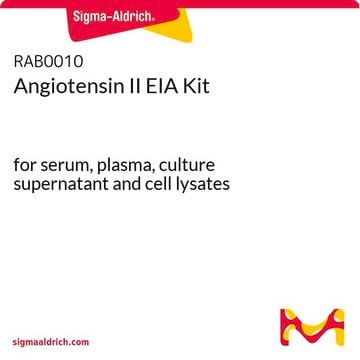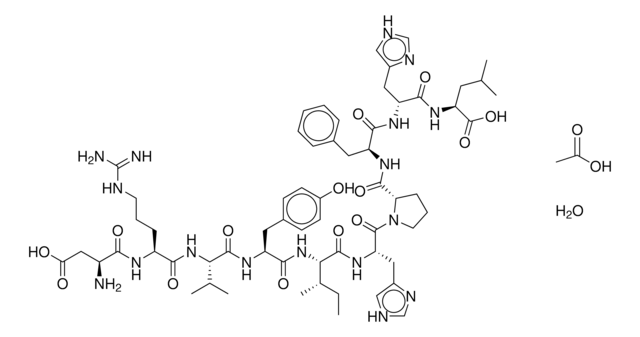AG782
Angiotensin Converting Enzyme, rat
Synonym(s):
ACE, CD143, DCP1, Peptidyl-dipeptidase A, Peptidase P
Sign Into View Organizational & Contract Pricing
All Photos(1)
About This Item
UNSPSC Code:
12352204
eCl@ss:
32160405
NACRES:
NA.42
Recommended Products
General description
ACE (kininase II, EC 3.4.15.1) is a zinc dipeptidyl carboxypeptidase. ACE catalyses both angiotensin I transformation to angiotensis II (a potent vasopressor agent) and degradation of bradikinin, a vaso-depressor. ACE appears to play a key role in regulating vascular tone and remodeling the development of atherosclerotic lesions. Increasing evidence suggests that ACE plays an important role in vascular pathology. Recent studies shows two new functions of this important enzyme: 1) It enhances the presentation of endogenous antigens (in particularly HIV 1 gp160-derived peptide p18) to MHC class I-restricted T-lynphocytes (ref. 1); 2) Its amino-terminal domain cleaves effectively hemoregulatory tetrapeptide N-Ac-Ser-Asp-Lys-Pro (ref. 2,3) which is involved in the control of hemapoetic stem cell proliferation (the amount of this peptide greatly decreases in patients undergoing cancer chemotherapy) (ref. 4).
Product Source: Isolated from rat lung using affinity chromatography (ref. 5).
Application
As a reference in SDS-PAGE and Western blotting [together with anti-ACE monoclonal (MAB4051) also available from Chemicon]. For Western blotting 500 ng/lane if gel is developed with anti-ACE MAB4051.
As a reference antigen for immunoprecipitation of ACE from various tissue samples (in combination with anti-ACE MAB4051).
As a source of pure ACE for different enzymatic studies of ACE (testing of ACE inhibitors, substrate specificity, kinetic measurements, etc.).
Optimal working concentration must be determined by the end user.
As a reference antigen for immunoprecipitation of ACE from various tissue samples (in combination with anti-ACE MAB4051).
As a source of pure ACE for different enzymatic studies of ACE (testing of ACE inhibitors, substrate specificity, kinetic measurements, etc.).
Optimal working concentration must be determined by the end user.
Unit Definition
Specific Activity: One unit will produce 1 μmoL of hippuric acid or His-Leu from Z-Phe-His-Leu per minute in 0.1 M phosphate buffer and 300 mM NaCl at pH 8.3 at 37°C.
Physical form
Liquid in 100 mM phosphate buffered saline, 150 mM NaCl, pH 7.4 with 0.2mM CHAPS. Purity is >95% by SDS-PAGE when 10 μg was loaded. Contains no preservative.
Other Notes
Concentration: Refer to Certificate of Analysis for each individual lot of this enzyme.
Legal Information
CHEMICON is a registered trademark of Merck KGaA, Darmstadt, Germany
Storage Class Code
12 - Non Combustible Liquids
WGK
WGK 2
Flash Point(F)
Not applicable
Flash Point(C)
Not applicable
Certificates of Analysis (COA)
Search for Certificates of Analysis (COA) by entering the products Lot/Batch Number. Lot and Batch Numbers can be found on a product’s label following the words ‘Lot’ or ‘Batch’.
Already Own This Product?
Find documentation for the products that you have recently purchased in the Document Library.
Customers Also Viewed
K J Rieger et al.
The Biochemical journal, 296 ( Pt 2), 373-378 (1993-12-01)
The degradation of N-Ac-Ser-Asp-Lys-Pro (AcSDKP), a negative regulator controlling the proliferation of the haematopoietic stem cell, by enzymes present in human plasma, has been investigated. Radiolabelled AcSD[4-3H]KP ([3H]AcSDKP, 1 mM) was completely metabolized in human plasma with a half-life of
Pig kidney angiotensin converting enzyme. Purification and characterization of amphipathic and hydrophilic forms of the enzyme establishes C-terminal anchorage to the plasma membrane.
Hooper, N M, et al.
The Biochemical Journal, 247, 85-93 (1987)
A Rousseau et al.
The Journal of biological chemistry, 270(8), 3656-3661 (1995-02-24)
Angiotensin I-converting enzyme (ACE) is a zinc-dipeptidyl carboxypeptidase, which contains two similar domains, each possessing a functional active site. Respective involvement of each active site in the degradation of the circulating peptide N-acetyl-seryl-aspartyl-lysyl-proline (AcSDKP), a negative regulator of hematopoietic stem
Our team of scientists has experience in all areas of research including Life Science, Material Science, Chemical Synthesis, Chromatography, Analytical and many others.
Contact Technical Service










